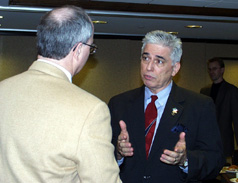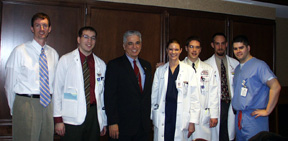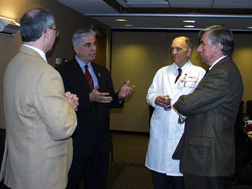 |
James Armitage, M.D., left, dean of the UNMC College of Medicine, talks with Donald Palmisano, M.D., J.D. |
“When a pregnant woman can’t find an obstetrician to deliver her baby because liability costs are so high – that’s a crisis,” Dr. Palmisano said Tuesday during a campus luncheon hosted by the UNMC medical student and resident sections of the AMA. “When a trauma victim can’t be sent to a trauma center because no neurosurgeon can afford to be on call – that’s a crisis. Medical liability rates are escalating to the point physicians say they can’t afford to stay in practice.”
The AMA has designated medical liability reform as its No. 1 priority because skyrocketing medical liability premiums — $200,000 a year or more in some high-risk specialties — are forcing physicians to limit services, retire early, or move to a state with reforms where premiums are more stable, said Dr. Palmisano, a general and vascular surgeon from New Orleans. The crisis is threatening access to care for patients in states without liability reforms.
 |
Dr. Donald Palmisano with UNMC residents and medical students. |
Only six states – Louisiana, Indiana, New Mexico, California, Colorado and Wisconsin — have strong tort reforms, he said, which ensure patient access to care and stabilize the liability insurance market.
On March 13, U.S. House of Representatives passed HEALTH Act (H.R. 5), patterned after a California law that has protected patients since 1975. H.R. 5 safeguards patients’ access to care through the following reforms: 1) allowing injured patients to recover unlimited economic damages; 2) limiting attorneys’ contingency fees on a sliding scale; 3) capping non-economic damages at $250,000; and 4) allocating damages by holding defendants liable only for their portion of responsibility. President Bush has voiced his support for the reform, Dr. Palmisano said.
“If you don’t have doctors, it doesn’t matter what medical coverage you have,” said Dr. Palmisano, who is confident reforms will occur. “Eventually, we’re going to win – hopefully this year – because otherwise patients are going to suffer.”
 |
From left to right, James Armitage, M.D., Donald Palmisano, M.D., J.D., Robert Wigton, M.D., and Rowen Zetterman, M.D. |
Dr. Palmisano encouraged individuals to support the medical liability reform by contacting their senators. For more information, visit the AMA Web site at http://www.ama-assn.org/.
Dr. Palmisano also mentioned other issues of importance to the medical education community including resident duty hours, medical education debt, and the Clinical Skills Assessment Exam for graduating medical students.